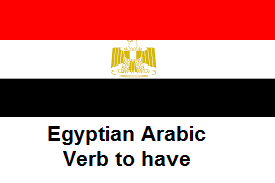Difference between revisions of "Language/Egyptian-arabic/Grammar/Use-of-Have-(3and)"
m (Quick edit) |
|||
| Line 1: | Line 1: | ||
[[File:Egyptian Arabic (Verb to have).png|alt=Egyptian Arabic (Verb to have)|thumb]]In Egyptian Arabic, | [[File:Egyptian Arabic (Verb to have).png|alt=Egyptian Arabic (Verb to have)|thumb]] | ||
In Egyptian Arabic, the verb "3and" (عند) is equivalent to "have" in English. This lesson explores the various uses of "3and" to express possession, obligation, and experiences. | |||
== Expressing Possession with "3and" == | |||
"3and" followed by the possessor and the object indicates possession. The verb agrees with the gender and number of the possessor. Examples: | |||
* عندي كتاب (3andi kitaab) - I have a book | * عندي كتاب (3andi kitaab) - I have a book | ||
* عندهم سيارة (3andohom seyaara) - They have a car | * عندهم سيارة (3andohom seyaara) - They have a car | ||
* عندها مال (3andha maal) - She has money | * عندها مال (3andha maal) - She has money | ||
== Expressing Obligation with "3and" == | |||
"laazem 3aleik" (لازم عليك) followed by a verb in the present tense expresses obligation or necessity. Examples: | |||
== | |||
* لازم عليك تدرس (laazem 3aleik tedros) - You have to study | * لازم عليك تدرس (laazem 3aleik tedros) - You have to study | ||
* لازم علينا نشتري طعام (laazem 3aleina neshteri Ta3am) - We have to buy food | * لازم علينا نشتري طعام (laazem 3aleina neshteri Ta3am) - We have to buy food | ||
== Expressing Possession with "Have Got" == | |||
"3and" with a past participle expresses possession, akin to "have got" in English. Examples: | |||
* عندي مفتاح المنزل (3andi miftaah el-manzel) - I've got the house key | * عندي مفتاح المنزل (3andi miftaah el-manzel) - I've got the house key | ||
* عندهم شقة كبيرة (3andohom shaqa kbira) - They've got a big apartment | * عندهم شقة كبيرة (3andohom shaqa kbira) - They've got a big apartment | ||
== Expressing Past Experiences with "Have Been" == | |||
"3and" followed by the past participle of "be" talks about past experiences. Examples: | |||
* عندي ذكريات جميلة من زيارتي لمصر (3andi zikrayat gameela men zyaraty le-masr) - I have good memories from my visit to Egypt | * عندي ذكريات جميلة من زيارتي لمصر (3andi zikrayat gameela men zyaraty le-masr) - I have good memories from my visit to Egypt | ||
* عندها كانت تدرس في جامعة القاهرة (3andha kanet tedros fe gam3a el-qahira) - She had been studying at Cairo University | * عندها كانت تدرس في جامعة القاهرة (3andha kanet tedros fe gam3a el-qahira) - She had been studying at Cairo University | ||
== | == Additional Contexts and Forms == | ||
"3and" can also be used in various other contexts and forms to express different nuances of possession and experience. Understanding its versatile applications can greatly enhance fluency in Egyptian Arabic. | |||
<span link>Related Lessons:</span> | |||
<span | * [[Language/Egyptian-arabic/Grammar|Egyptian-arabic Grammar]] | ||
* [[Language/Egyptian-arabic/Grammar/Adjectives|Adjectives]] | |||
* [[Language/Egyptian-arabic/Grammar/Past-Tense|Past Tense]] | |||
* [[Language/Egyptian-arabic/Grammar/Pronouns|Pronouns]] | |||
Revision as of 19:05, 16 November 2023
In Egyptian Arabic, the verb "3and" (عند) is equivalent to "have" in English. This lesson explores the various uses of "3and" to express possession, obligation, and experiences.
Expressing Possession with "3and"
"3and" followed by the possessor and the object indicates possession. The verb agrees with the gender and number of the possessor. Examples:
- عندي كتاب (3andi kitaab) - I have a book
- عندهم سيارة (3andohom seyaara) - They have a car
- عندها مال (3andha maal) - She has money
Expressing Obligation with "3and"
"laazem 3aleik" (لازم عليك) followed by a verb in the present tense expresses obligation or necessity. Examples:
- لازم عليك تدرس (laazem 3aleik tedros) - You have to study
- لازم علينا نشتري طعام (laazem 3aleina neshteri Ta3am) - We have to buy food
Expressing Possession with "Have Got"
"3and" with a past participle expresses possession, akin to "have got" in English. Examples:
- عندي مفتاح المنزل (3andi miftaah el-manzel) - I've got the house key
- عندهم شقة كبيرة (3andohom shaqa kbira) - They've got a big apartment
Expressing Past Experiences with "Have Been"
"3and" followed by the past participle of "be" talks about past experiences. Examples:
- عندي ذكريات جميلة من زيارتي لمصر (3andi zikrayat gameela men zyaraty le-masr) - I have good memories from my visit to Egypt
- عندها كانت تدرس في جامعة القاهرة (3andha kanet tedros fe gam3a el-qahira) - She had been studying at Cairo University
Additional Contexts and Forms
"3and" can also be used in various other contexts and forms to express different nuances of possession and experience. Understanding its versatile applications can greatly enhance fluency in Egyptian Arabic.
Related Lessons:
